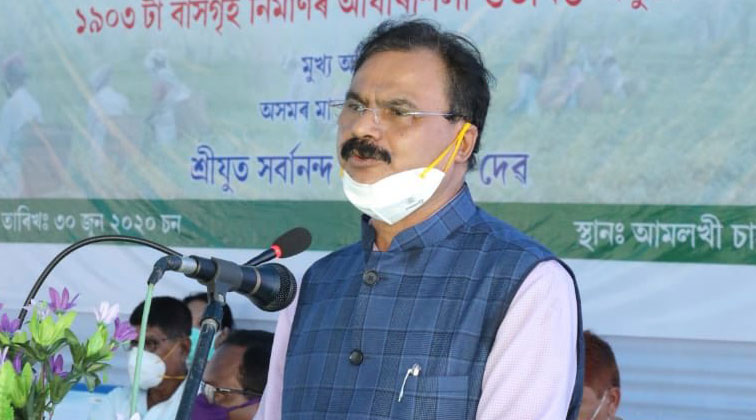An Assam government decision to speed up industrialisation by suspending the licence-permit regime for three years and easing land conversion has put under glare the BJP government’s election promise to protect the land and rights of the indigenous people.
Industries minister Chandramohan Patowary had on June 29, after a council of ministers’ (CoM) meeting, tweeted about the decision to facilitate the establishment of micro, small and medium enterprises (MSMEs) in Assam.
The government feels the move would help create jobs for the lakhs of people hit by the lockdown, including the returned migrant workers.
“Now anyone will be able to set up industry in Assam just by submitting a self-declaration. No permission, clearance or licence will be required for three years,” Patowary had said.
“Land will also be deemed converted for industrial purposes. Such a bold and advantageous change is expected to accelerate the industrialisation process in Assam.”
The chief minister’s office had echoed Patowary, saying: “In a major decision to boost Aatma Nirbhar Assam, the CoM passed the MSME Ordinance which puts an end to the process of taking multiple permissions for setting up MSMEs in the state for (the) next three years.”
Industries account for 39 per cent of Assam’s GDP, providing direct employment to about four lakh people and indirect employment to around 20 lakh. Of the state’s more than 66,000 industries, 99.9 per cent are MSMEs.
Although industry has welcomed the government move, the apparently blanket permission for converting any plot of land to set up industries has triggered apprehension and criticism.
The critics want clarity about the land-use policy, fearing that a blanket nod would lead to the indigenous people losing their land and, consequently, their identity in the long run.
The Congress says the move runs counter to a December 21 cabinet decision, taken during the peak of the anti-CAA agitation, to bring in two laws to protect the land of the indigenous people.
“(It’s the) most anti-indigenous decision by the Assam cabinet to allow indiscriminate conversion of agricultural land for non-agricultural purposes without permission of revenue authorities,” senior advocate Nilay Dutta said.
“Land speculators will benefit. Non-locals will take over all the rural land of the indigenous people.”
Singer-composer Joi Barua tweeted: “...Considering the recent tragedy at #Baghjan & the problems at #DehingPatkai, I think the levels of safeguards and checks around ecosensitive zones should go up. Not down. Please tell us how you want to go about such areas. There cannot be ambiguity.”
Baghjan and Dehing-Patkai, eco-sensitive zones in eastern Assam, have been in the news over a gas well blowout and illegal mining, respectively.
Upamanyu Hazarika, leader of the anti-migrant Prabajan Virodhi Manch pressure group, said the ordinance was a death knell for not only farmers but the 115 small indigenous ethnic communities in Assam.
“A government that came to power riding the slogan of ‘jati, mati, bheti’, that is, the protection of indigenous rights and land, has not only failed (to keep its promise) but has taken proactive steps... to destroy indigenous identity,” Hazarika said.
Former chief minister Tarun Gogoi and Congress legislature party leader Debabrata Saikia too referred to the “jati, mati, bheti” slogan.
“Nowhere in the country is there such a blanket permission to convert agricultural land for non-agricultural purposes,” Gogoi said.
Saikia asked the government to revoke the move or face protests.
The Liberal Democratic Party said it was “unacceptable for agricultural land to be cleared for setting up industries” at a time the return of lakhs of migrant workers had made it imperative to “focus on the rural economy and agriculture”.
Patowary told this newspaper that all the new proposals would come to the industries commissioner with a self-declaration.
“If the MSME unit is hazardous or a polluting one, or is near an eco-sensitive zone, it will not be acknowledged by the commissioner. We are committed to protecting our environment,” he said.
On the automatic conversion of farmland for industry, he said that apart from industrial estates and an industrial corridor, most existing units were on agricultural land.










